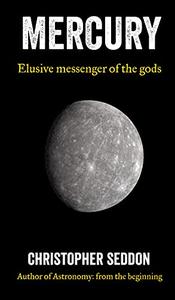
Mercury: Elusive messenger of the gods (A Short Guide to the Planets) by Christopher Seddon
English | July 13, 2021 | ISBN: N/A | ASIN: B099FMTHJX | 50 pages | EPUB | 0.21 Mb
A concise 12,000-word Kindle short read about Mercury, which has now regained its place as the Solar System's smallest planet. Although brighter than any star, Mercury is so elusive that most of us never see it. It is difficult to observe and only two space probes have ever reached it - yet Mercury might hold clues about the early history of our Solar System.
Did you know?
*Eccentric: Mercury has the most eccentric orbit of any major planet in the Solar System, albeit less than that of Pluto. Its distance from the Sun ranges from 0.307499 a.u. at perihelion to 0.466697 a.u. at aphelion, meaning that it is just over 50 percent further away at aphelion. Mercury's orbital inclination of 7°00' is also the highest of any major planet, although once again this is less than that of Pluto. Conversely, its axial tilt of 2 arcmin is the lowest of any known Solar System body.
*Varied: Temperatures on Mercury range from a maximum of +427°C to a minimum of -183 °C, a range of 610 °C. No other planet in the Solar System experiences such a wide range of temperatures. Zinc melts at 419.5 °C; the minimum temperature is only just above the boiling point of argon (-189.34 °C).
*Moonless: Mercury and Venus are the only two major planets to lack a moon.
*Escaped: In the 1960s, it was suggested that Mercury was an escaped moon of Venus. This would have solved the problem with the latter's lack of a moon.
*Observed: Elusive as Mercury is, it was known to the ancients and has probably been known since prehistoric times. It appears in the records of the Babylonians, Greeks, Indians, and Maya. As with Venus, the Ancient Greeks initially believed that the morning and evening apparitions of Mercury were two different bodies, but they eventually realised that they are both the same object, possibly during the fifth century BC.
*Too close: Mercury is the only Solar System planet (apart from Earth) never to have been observed with the Hubble Space Telescope. This is because it is so close to the Sun that there is a danger that the telescope could point directly at the Sun, which would damage the instrumentation.
*Quicksilver: Mercury has also given its name to the element mercury, the only metal to be a liquid at room temperatures. Although no longer used in thermometers due to its toxicity, mercury is still often used as a synonym for high temperature (as in "the mercury reached highs of 30° Celsius over the weekend"). Mercury was one of the seven metals known in the ancient world, along with gold, silver, copper, tin, iron, and lead. It was known in Latin ashydrargyrum('water-silver') and subsequently became (an often still is) known as quicksilver. Alchemists associated each of the seven metals of the ancients with one of the seven classical planets (the five naked-eye planets, plus the Sun and Moon). For example, gold is ruled by the Sun, silver by the Moon, and lead by Saturn. Quicksilver is ruled by Mercury, and eventually the name of the planetary ruler was applied to the metal itself.
*Transits: Transits across the face of the Sun by Mercury are more frequent than those by Venus and there were 14 during the last century. That the inner planets could transit the solar disk was first proposed by the Greek astronomer Claudius Ptolemy (c. AD 100-170) in his workPlanetary Hypotheses. He suggested the reason that a transit had never been observed was either because the planets were too small to be seen, or transits simply occurred too infrequently. The first successful prediction of a transit was made by Johannes Kepler (1571-1630) for the transit of 7 November 1631. The transit was observed by the French astronomer Pierre Gassendi (1592-1655).
Buy Premium From My Links To Get Resumable Support,Max Speed & Support Me

https://rapidgator.net/file/fb7b5effdf3d342690608a32af9b6e1f/pgbhq.Mercury.Elusive.messenger.of.the.gods.A.Short.Guide.to.the.Planets.rar.html

http://nitro.download/view/28A5626E1685E72/pgbhq.Mercury.Elusive.messenger.of.the.gods.A.Short.Guide.to.the.Planets.rar

https://uploadgig.com/file/download/2f7bbD78Cf410d80/pgbhq.Mercury.Elusive.messenger.of.the.gods.A.Short.Guide.to.the.Planets.rar
